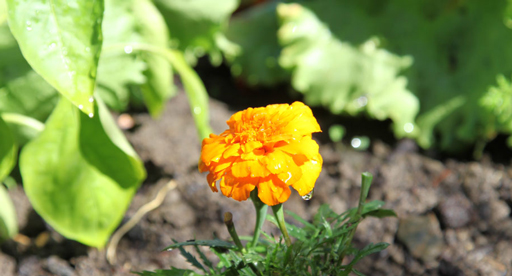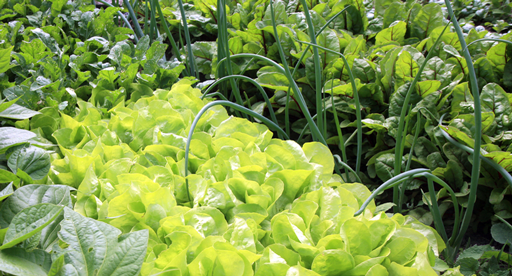The Best Companion Plants For Passionfruit
The Best Companion Plants for Passionfruit
Passionfruit is a delicious and versatile fruit that can be enjoyed in a variety of ways. Whether you like to eat it fresh, juice it, or bake with it, passionfruit is a great addition to any garden.
One of the best things about passionfruit is that it is relatively easy to care for. However, there are a few things you can do to help your passionfruit plants thrive. One of these things is to plant them with companion plants.
Companion planting is the practice of planting certain plants together to benefit each other. There are many different companion plants that can be beneficial for passionfruit, but some of the best include:
- Marigolds: Marigolds are a great companion plant for passionfruit because they help to repel pests. They also attract beneficial insects, such as ladybugs, which help to control pests.

- Nasturtiums: Nasturtiums are another great companion plant for passionfruit. They help to attract beneficial insects, such as bees and butterflies, which help to pollinate the passionfruit flowers.

- Borage: Borage is a nitrogen-fixing plant, which means it helps to improve the soil quality for the passionfruit plants. It also attracts beneficial insects, such as hoverflies, which help to control pests.

- Chives: Chives are a great companion plant for passionfruit because they help to repel pests, such as aphids and whiteflies. They also help to improve the flavor of the passionfruit fruit.

- Basil: Basil is another great companion plant for passionfruit because it helps to repel pests, such as mosquitoes and flies. It also helps to improve the flavor of the passionfruit fruit.

In addition to these plants, there are a few other plants that can be beneficial for passionfruit, such as:
- Cucumbers: Cucumbers and passionfruit can be planted together because they have similar growing requirements. They both need full sun and well-drained soil.

- Beans: Beans and passionfruit can also be planted together because they help to improve the nitrogen content of the soil. This can benefit both plants.

- Tomatoes: Tomatoes and passionfruit can be planted together because they help to attract beneficial insects. These insects help to control pests that can damage both plants.

When choosing companion plants for passionfruit, it is important to consider the plants' growing requirements. Some plants, such as marigolds and nasturtiums, prefer full sun, while others, such as chives and basil, prefer partial shade. It is also important to consider the plants' water needs. Some plants, such as cucumbers and tomatoes, need regular watering, while others, such as passionfruit, are more drought-tolerant.
By planting passionfruit with the right companion plants, you can help to ensure that your plants thrive. The plants will help each other to repel pests, improve the soil quality, and attract beneficial insects. This will lead to healthier plants and a more bountiful harvest.
Passionfruit is a delicious and versatile fruit that can be enjoyed in a variety of ways. But did you know that there are certain companion plants that can help to improve the growth and productivity of your passionfruit vine?
Some of the best companion plants for passionfruit include:
- Marigolds: Marigolds help to attract beneficial insects, such as ladybugs and lacewings, which can help to control pests. They also help to suppress the growth of weeds.
- Basil: Basil helps to repel pests, such as mosquitoes and flies. It also helps to improve the flavor of passionfruit.
- Borage: Borage attracts beneficial insects, such as bees and butterflies. It also helps to improve the nitrogen content of the soil.
- Comfrey: Comfrey is a nitrogen-fixing plant, which means that it helps to add nitrogen to the soil. This can benefit passionfruit, as nitrogen is an essential nutrient for plant growth.
If you're looking to improve the growth and productivity of your passionfruit vine, I encourage you to check out Gardenia Inspiration. This website provides a wealth of information about companion planting, including specific recommendations for companion plants for passionfruit.
FAQ of companion plant passionfruit
Q: What are the best companion plants for passionfruit?
A: Passionfruit can be companion planted with a variety of plants, but some of the best include:
- Marjoram: Marjoram helps to attract pollinators, which is essential for fruit production. It also helps to repel pests, such as aphids and whiteflies.
- Lemon balm: Lemon balm is another plant that attracts pollinators. It also helps to improve the flavor of passionfruit.
- French marigolds: French marigolds help to repel nematodes, which can be a problem for passionfruit plants.
- Potatoes: Potatoes help to improve the soil structure, which can benefit passionfruit plants.
- Carrots: Carrots help to suppress weeds, which can help to keep passionfruit plants healthy.
Q: What are the benefits of companion planting with passionfruit?
A: There are several benefits to companion planting with passionfruit, including:
- Improved pollination: Companion plants can help to attract pollinators, which is essential for fruit production.
- Repulsion of pests: Companion plants can help to repel pests, which can help to protect passionfruit plants from damage.
- Improved soil health: Companion plants can help to improve the soil structure and fertility, which can benefit passionfruit plants.
- Suppression of weeds: Companion plants can help to suppress weeds, which can help to keep passionfruit plants healthy.
- Increased biodiversity: Companion planting can help to increase biodiversity in the garden, which can benefit all plants.
Q: What are some of the challenges of companion planting with passionfruit?
A: There are a few challenges that can be associated with companion planting with passionfruit, including:
- Competitive plants: Some plants can be too competitive for passionfruit plants, so it is important to choose companion plants carefully.
- Diseases and pests: Companion plants can sometimes transmit diseases or pests to passionfruit plants. It is important to be aware of this risk and to take steps to prevent it.
- Water and nutrient competition: Companion plants can compete with passionfruit plants for water and nutrients. It is important to water and fertilize the plants appropriately to avoid this problem.
Q: How do I choose the right companion plants for my passionfruit?
A: When choosing companion plants for passionfruit, it is important to consider the following factors:
- The needs of the passionfruit plant: Passionfruit plants need full sun, well-drained soil, and regular watering. It is important to choose companion plants that have similar needs.
- The climate: Passionfruit plants are not cold-hardy. It is important to choose companion plants that are also tolerant of the climate in your area.
- The pests and diseases that are common in your area: If there are certain pests or diseases that are common in your area, you may want to choose companion plants that help to repel or suppress them.
- Your personal preferences: Ultimately, the best companion plants for your passionfruit are the ones that you like the most and that you think will work well in your garden.
Image of companion plant passionfruit
- Potatoes: Potatoes are a good companion plant for passionfruit because they help to suppress weeds and improve soil aeration.

- Beetroot: Beetroot is another good companion plant for passionfruit, as it helps to attract beneficial insects and improve soil fertility.

- Swiss chard: Swiss chard is a nitrogen-fixing plant, which means that it helps to enrich the soil for other plants. It is also a good companion plant for passionfruit because it helps to deter pests.

- Carrots: Carrots are a good companion plant for passionfruit because they help to repel nematodes, which are pests that can damage passionfruit plants.

- Spinach: Spinach is a good companion plant for passionfruit because it helps to suppress weeds and improve soil drainage.

Post a Comment for "The Best Companion Plants For Passionfruit"